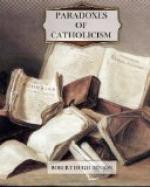III. Turn now to the coming of Jesus Christ on earth. He came, as we know now, a Divine Teacher from heaven to make a Revelation from God; He came, that is, to demand from men a sublime Act of Faith in Himself. For He Himself was Incarnate Wisdom, and He demanded, therefore, as none else can demand it, a supreme acceptance of His claim. No progress in Divine knowledge, as He Himself tells us, is possible, then, without this initial act. Whosoever shall not receive the kingdom of God as a little child shall not enter into it. Every soul that is to receive this teaching in its entirety must first accept the Teacher and sit at His feet.
Yet He did not make this claim merely on His own unsupported word. He presented His credentials, so to say; He fulfilled prophecy; He wrought miracles; He satisfied the moral sense. Believe Me, He says, for the very works’ sake. Before, then, demanding the fundamental act of Faith on which the reception of Revelation must depend, He took pains to make this Act of Faith reasonable. “You see what I do,” He said in effect, “you have observed My life, My words, My actions. Now is it not in accordance with Reason that you should grant My claims? Can you explain away, reasonably, on any other grounds than those which I state, the phenomena of My life?”
Certainly, then, He appealed to Reason; He appealed to Private Judgment, since that, up to that moment, was all that His hearers possessed. But, in demanding an Act of Faith, He appealed to Private Judgment to set itself aside; He appealed to Reason as to whether it were not Reasonable to stand aside for the moment and let Faith take its place. And we know how His disciples responded. Whom do you say that I am?... Thou art the Christ, the Son of the Living God.
At that instant, then, a new stage was begun. They had used their Reason and their Private Judgment, and, aided by His grace, had concluded that the next reasonable step was that of Faith. Up to that point they had observed, dissected, criticized, and analyzed His words; they had examined, that is, His credentials. And now it was Reason itself that urged them towards Faith, Reason that abdicated what had hitherto been, its right and its duty, that Faith might assume her proper place. Henceforth, then, their attitude must be a different one. Up to now they had used their Reason to examine His claim; now it was Faith, aided and urged by Reason, which accepted it.




